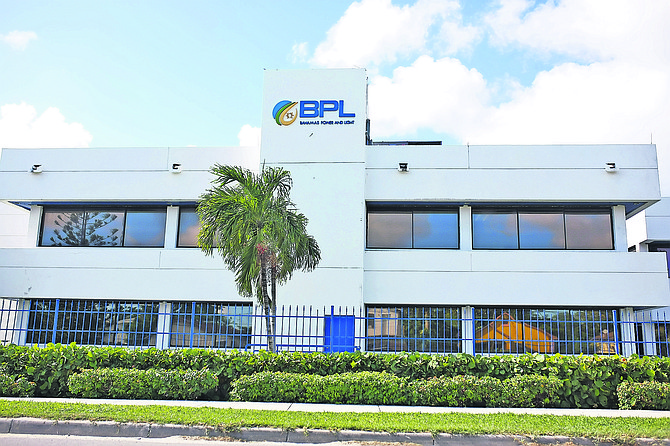By NEIL HARTNELL
Tribune Business Editor
nhartnell@tribunemedia.net
The $66m in delinquent debt owed to Bahamas Power & Light (BPL) by homeowners and businesses exposes the potential weakness in plans for the utility’s multi-million dollar refinancing.
The extent of the private sector’s receivables was highlighted by Dr Donovan Moxey, BPL’s chairman, in his presentation to the Accountants’ Week seminar where he revealed that a collective $88.2m is now past due.
Some 74.9 percent, or three-quarters, of the latter sum is 90 days or more past due, making it equivalent to a bank’s non-performing loan and demonstrating just why BPL has to crack down on deadbeat bill payers if it is to generate sufficient income to meet repayments to investors who buy into the planned $650m National Utility Investment Bond.
Dr Moxey did not respond to Tribune Business inquiries before press time last night, but the figures he revealed give further weight to warnings by Paul Maynard, the Bahamas Electrical Workers Union (BEWU) president, that the state-owned utility must significantly improve its collection methods if compliant bill payers are not to be burdened with ever-increasing bond repayment fees.
Bahamian households and businesses are effectively being called upon to bail-out BPL from decades of financial mismanagement and waste by paying a bond servicing fee that will be attached to their bills, and Mr Maynard said its introduction once the bond issue is placed in early 2020 will mean an end to the practice where bill duckers have been able to rely on friends, family and political connections to avoid disconnection.
BPL executives have repeatedly said the bond servicing fee will be a small charge compared to customers’ overall bills, and will be more than offset by greater savings generated by the more efficient Wartsila engines and, ultimately, the proposed Shell power plant.
Yet the utility’s executives will have to make sure they collect on all bills, and it is unclear whether a collections crack down would go so far as to cut-off delinquent resorts and other large employers given the significant impact it would have on jobs.
Some $46.602m, or 37.33 percent, of BPL’s total receivables were current, representing sums billed in the current cycle. Yet some $5.334m, or 4.27 percent, was over 30 days past due and another $6.818m or 5.46 percent over 60 days’ past due.
“At year end, total receivables from the private sector stood at $125 million, up from the prior year’s $123 million,” Dr Moxey told the Accountants Week’ seminar of BPL’s financial position. “Amounts due for greater than 60 days stand at $72.9m (2017: $69.8m).
“Challenging economic times and higher fuel costs continues to impact the Corporation as poor payment results in reduced cash flow for the essential operational and capital projects.”
Defending the decision to refinance BPL via the upcoming bond issue rather than sources such as bank debt, Dr Moxey said the fee associated with the former “would be about half as much for consumers” when compared to traditional loans.
“We compared the tool that had already been envisioned, the rate reduction bond (RRB), with traditional bank debt, and the bond is clearly the optimal choice for financing both the restructuring of our legacy debt and the upgrade of our generation system,” Dr Moxey said.
“The reasons include a global universe of investors rather than the smaller universe of banks, a broader lender base, relief to the Government balance sheet in that it does away with the Government guarantee.
“If that isn’t clear enough, let’s look directly at the pain-point: The fee itself. As you can see, by all reasonable measures the fee imposed due to the RRB would be about half as much as bank debt would require.”
While the bond’s servicing costs can be spread out over its 20-25 year maturity, Dr Moxey said bank debt would have to be repaid over a much shorter term and therefore impose higher payments on BPL’s customers.
Arguing that stabilising energy supply reliability and costs will be “a game changer for the economy of The Bahamas”, the BPL chairman said: “Part of our problem in the past has been that when we did have cash we spent it poorly.
“And the undercapitalisation that has plagued the company since the unsupported decision to slash the base rates has put us perennially in a position to play defense. With the cash infusion from the RRB, we will at last be able to go on offense.
“We took a real beating this summer due to the fact that our aging and poorly maintained generation fleet just wasn’t up to the challenge. We didn’t have the capacity to meet demand, and it was a mad scramble to keep as many customers on as possible at any given time.
“We want to clearly say everyone at BPL, from leadership on down, understands the anger and frustration our inability to keep the lights on during the summer caused, but I am here to say that we have turned the corner.”





Comments
Well_mudda_take_sic 6 years, 3 months ago
Utter BS. The 'do-not-disconnect' directives will never go away as long as the FNM and PLP political parties exist. These corrupt practices are now culturally ingrained into our political system.
DWW 6 years, 3 months ago
once again the people have to pay extra to cover the bills of the chosen few. chosen by whom? surely no one believes these people are ordained by god?
Dawes 6 years, 3 months ago
Yet again another example of it being better for you to not pay then it is to pay. The people who pay each month will be the ones who suffer the most, those that don't BPL will not punish. Same as real property,. same as basically everything Government does.
Sign in to comment
OpenID